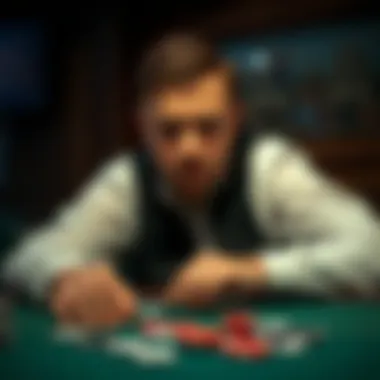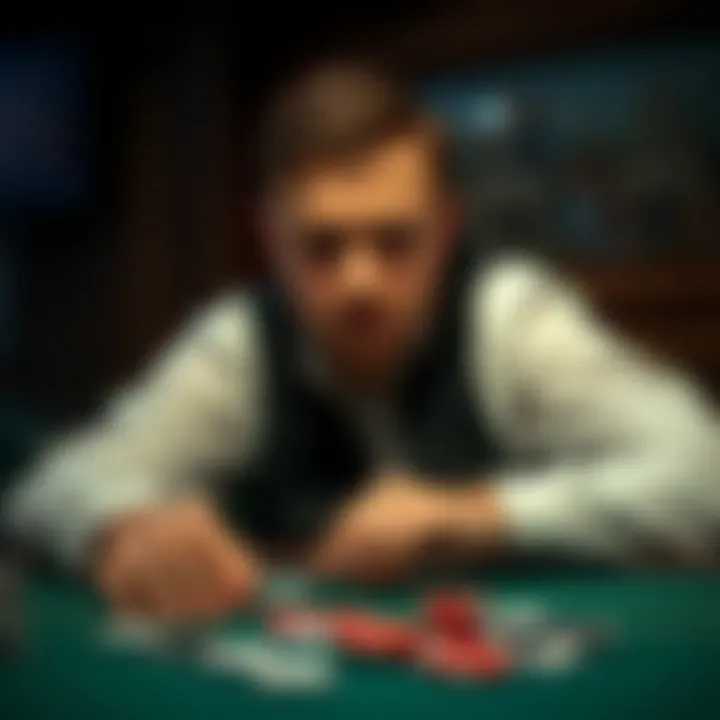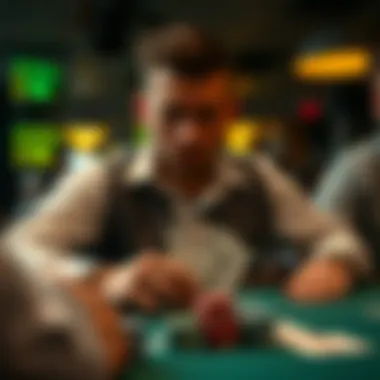Understanding Lucky Days in Betting and Poker Strategies


Intro
The idea of luck often dances around the fringes of gambling, where superstition and strategy can clash and intertwine. Many players believe certain days are ripe for winning, imbuing them with a sense of optimism that can greatly affect their gaming decisions. This exploration into the concept of lucky days unveils the various layers of psychology, tradition, and practical strategy that surround these beliefs.
Betting and poker are not just about cold calculations; they also tap into emotions, instincts, and, yes, a bit of luck. It’s a complex interplay that influences how players perceive outcomes. For some, the notion of luck becomes a psychological crutch or even a source of motivation, driving them to take calculated risks on particular days that they deem fortunate.
Through this article, we aim to unravel the fascinating narrative of lucky days in both betting and poker.
Betting Strategies
In the world of betting, understanding your strategies can transform your experience from mere chance to a strategic endeavor. Players often look for patterns, not just in the games they play but also in the timing of their bets.
Understanding Odds and Payouts
A keen grasp on odds is essential for any bettor. Odds aren't merely numbers; they represent the likelihood of an event occurring. For instance, a football match with odds of 3/1 suggests that for every 1 unit staked, you stand to win 3 if your prediction holds true. Periods classified as 'lucky days,' such as Fridays or the first of the month, can lead some players to bet on confident feelings rather than statistical probabilities.
When players mingle luck with odds, they often ignore key aspects that could sway the results. A solid method would be to analyze the event beforehand, gauge the teams or players involved, and how their past performances align with your personal notions of luck.
Advanced Betting Techniques
Advanced betting techniques, such as value betting or arbitrage betting, can help one mitigate the uncertainty that comes with gambling. Value betting focuses on finding bets that are mispriced according to the perceived odds, capitalizing on overvalued opportunities. This is where some bettors might hold back their wagers, waiting for that so-called lucky day to press their advantage. Meanwhile, arbitrage betting offers a risk-free way to bet on all possible outcomes of an event, allowing players to secure a profit regardless of the outcome.
Using a combination of statistical analysis and personal intuition on what constitutes luck can help create a more robust betting strategy, optimizing your potential outcomes whether you believe today is your lucky day or not.
Poker Insights
Turning the spotlight towards poker, we find that the element of luck bends differently here. Unlike betting on sports where outcomes can often hinge on external factors, poker places you in the driver’s seat through strategy and psychology.
Poker Variants and Their Strategies
Each poker variant, from Texas Hold'em to Omaha, presents its own brand of strategy and demands a clear understanding of the player interactions. Understanding how people react under different pressures can offer insights into their behavioral patterns, especially on perceived lucky days where confidence can skew rational choices.
In Texas Hold'em, for example, determining when to hold or fold often relies on reading your opponents as much as it relies on the cards dealt. When players think it’s their lucky day, they might make bolder moves. Recognizing when that luck graces their table can shift the dynamics drastically.
Key Skills for Successful Poker Play
Successful poker is built on a tripod of skills: calculation, emotional intelligence, and adaptability. The ability to keep a cool head, read the table, and discern when players are riding high on luck is crucial. Furthermore, players who are aware of their own perceptions of luck can better manage their bankrolls and risk.
"Luck is what happens when preparation meets opportunity."
These foundational skills become particularly salient when evaluating choices made on days deemed lucky. Knowing yourself as a player can drastically alter how you interact with luck.
By exploring these intricate aspects of betting and poker, players can refine their strategies while understanding the psychological undertones that accompany notions of luck in their gaming ventures. To delve deeper into gaming strategies or psychological insights, countless resources are available to enhance your journey into the betting world. Consider checking out articles on Wikipedia, or discussions on Reddit.
Most importantly, consistent practice, awareness, and a clear mind will often serve you better than relying solely on the whims of fate.
Defining Lucky Days in Gambling
Understanding what constitutes a lucky day in gambling holds paramount importance for anyone who bets or plays games involving chance. It isn’t just a whimsical notion; many gamblers swear by specific days as being particularly favorable for winning. Recognizing the nuances of lucky days can significantly influence betting strategies and decision-making processes.
One element worth considering is how personal beliefs shape these perceptions. For instance, if a bettor experiences a streak of good fortune on a particular day, they might come to associate that day with luck, compelling them to return whenever the calendar aligns. This could stem from cultural backgrounds, superstitions, or even personal milestones.
The benefits of defining lucky days in gambling are twofold. Firstly, it can bolster the gambler's confidence, enhancing their overall experience by instilling a sense of hope and excitement. Secondly, identifying these days can help fine-tune strategies for assessing risk and timing plays—akin to knowing when to hold ‘em and when to fold ‘em.
Here are some considerations when exploring the concept:
- Psychological Boost: Feeling lucky can lead to more rational decision-making.
- Cultural Influences: Different cultures may have varying beliefs on what days are considered lucky.
- Strategic Planning: Gamblers often develop strategies based on these perceptions to optimize their gameplay.
Luck is often about opportunity, but knowing when and how to chase those opportunities is what sets apart the seasoned gamblers from the novices.


With this foundation in place, we can now delve deeper into the cultural perspectives on luck that further complicate and enrich our understanding of what lucky days mean in the world of gambling.
Historical Context of Luck in Gambling
The historical context of luck in gambling serves as a vital foundation for understanding how luck has evolved and influenced betting behaviors across centuries. From ancient rituals to modern gaming strategies, the concept of luck has woven itself into the very fabric of gambling. It’s not merely about throwing dice or shuffling cards; it is intertwined with culture, belief systems, and human psychology. Exploring this historical backdrop allows gamblers, poker players, and bettors to recognize patterns, rituals, and superstitions that have shaped their current experiences. Additionally, it can spur individuals to reflect on their own beliefs concerning luck and its impact on their gaming strategies.
Ancient Civilizations and Their Views on Luck
When we zoom in on ancient civilizations, the influence of luck in gambling becomes increasingly apparent. Societies such as the Romans and Egyptians integrated the idea of luck into their daily lives and gambling practices. Dice, status symbols of luck, were used as early as 3000 BCE, not just for games, but also as instruments of chance in larger societal contexts. For example, the Romans believed that certain days were more auspicious for gambling, aligning their gaming endeavors with favorable celestial events.
The Egyptians, meanwhile, revered luck in the form of deities—ancestors who directly influenced daily activities, including gaming. For them, gambling was viewed not merely as a pastime, but as a form of divine interaction, where a win could signal favor and a loss could mean displeasure from the gods. Such perspectives highlight that luck was not just random chance; it had deeper spiritual and social dimensions. This cultural lens shapes how contemporaries view luck even today, showing that histories of gambling are often tales of hope, risk, and the unpredictability of fortune.
Evolution of Luck in Modern Gambling Practices
Fast forward to modern times, and the notion of luck has morphed dramatically. While many still hold onto superstitions — like never shuffling cards backwards or wearing a specific color on game day — professional players often tout analytical approaches to luck. With the rise of technology, we have systems that analyze thousands of games to predict outcomes. Yet, amidst all this, the essence of luck persists.
Modern games like poker and sports betting integrate complex strategies and algorithms, yet they still heavily lean on the unpredictable nature of chance. There’s an unwritten belief among seasoned players that sometimes the cards just fall the right way, or a player will hit a streak of fortune that seems beyond statistics.
"Luck is what happens when preparation meets opportunity." — Seneca
Psychological Aspects of Luck and Decision-Making
In the world of gambling, the interplay between luck and decision-making is a nuanced affair. Understanding how luck influences behavior can be crucial, especially for gamers looking to enhance their experience. The perception of lucky days can significantly affect how players approach betting. Feeling lucky may lead a player to take risks they otherwise wouldn’t, thus shaping both their strategy and outcomes. Moreover, recognizing psychological influences enables players to make informed decisions rather than relying solely on hunches or superstitions.
The Role of Cognitive Biases
Cognitive biases often play a hidden hand in how individuals perceive luck. One common bias is the illusion of control. Gamblers frequently believe they can influence outcomes in games that are, at their core, purely chance-based. This sense of control can lead players to pick particular days they feel will bring better fortune, even if statistically, it makes little difference.
For example, someone might believe that if they won on a Saturday last month, it stands to reason that they’ll win again on a similar day in the future. Yet, the outcomes are independent of past results in games of pure chance like slot machines or roulette. The gambler's fallacy, another cognitive bias, perpetuates this thinking, as players think that they’re "due" for a win after a series of losses.
"The mind tricks itself into believing it can manipulate the random, which often leads to poor judgments and erratic decision-making."
In considering betting strategies, players must be aware of these biases. By actively acknowledging that their feelings towards certain days are influenced more by emotions than by odds, they can develop strategies based on sound reasoning rather than gut feelings.
Emotional Influences on Gambling Behavior
Emotions have an undeniable effect on gambling choices. When players are in high spirits, they may wager larger amounts or gamble more frequently, driven by feelings of enthusiasm. Conversely, a moment of despair could lead them to chase losses during what they perceive to be lucky days. This cycle can create a volatile gambling experience.
Moreover, psychological states associated with winning or losing can become self-reinforcing. For instance, when experiencing a string of wins, a gambler may feel invincible, prompting riskier bets. Alternatively, after a loss, the emotional toll might lead them to abandon rational decision-making altogether.
In such situations, recognizing the emotional drivers of one’s behavior can be beneficial. Keeping a gambling journal can help in tracking emotional states and outcomes, allowing gamblers to identify patterns that lead to sound or erratic decision-making. This reflection aids players in maintaining clarity in judgment, especially on days they consider lucky.
Understanding cognitive biases and emotional influences not only sheds light on personal behavior but also equips players with tools to enhance their gaming strategies. Playing with an awareness of these psychological aspects can make all the difference between casual play and calculated success.
Identifying Your Lucky Days
Identifying your lucky days can be a subtle yet powerful consideration when it comes to gambling, especially in games like poker or sports betting. While many dismiss luck as mere superstition, the idea of finding a personal lucky day transcends simple belief. It opens a deeper understanding of how psychological factors can influence gambling performance.
A lucky day can provide an emotional edge or confidence boost, which, in turn, may enhance decision-making during gameplay. This merging of belief and reality often becomes a significant aspect of the gambler’s mindset. Recognizing such days can enable better planning, potentially translating into larger wins and enhanced experiences at the gaming table or sportsbook. It’s not merely about the outcomes; it’s about fostering a mental environment where success seems plausible.
Influence of Personal Events and Milestones
Human beings are creatures of habit and memory, guided by their personal history. The influence of personal events and milestones often shapes one’s perception of luck. For instance, winning on a particular day that marks an anniversary or a significant achievement can create a lasting association that the day itself is auspicious for gambling.
Certain personal milestones, like birthdays or anniversaries, are often infused with emotional significance. They carry stories and memories that anchor in the gambler's psyche, turning these days into self-fulfilling prophesies. Take someone who won their first big poker tournament on their birthday. They might later approach every birthday with the expectation of success, creating an optimistic outlook.
- Emotional resonance: Personal events resonate emotionally and reinforce beliefs about luck.
- Confidence boost: Winning on significant days can serve to bolster confidence in future plays.
- Ritual significance: The very act of participating in gambling activities on those identified days can provide a psychological ritual, enhancing focus and mindset.
Astrological Perspectives on Luck
Diving into the mystical side, many people turn to astrological influences when seeking their lucky days. Astrology suggests that celestial positions can have profound effects on life events, including gambling outcomes. For some, understanding their astrological chart becomes a roadmap towards identifying favorable conditions for luck.


The belief is that the movements of planets and stars create favorable alignments that can enhance luck or predispose individuals to certain areas of success. For example, a gambler might consult horoscopes that promise good fortune on specific days dictated by their zodiac sign. Events like full moons or favorable alignments of planets are often seen as optimal times for taking a risk in a game of chance.
- Zodiac characteristics: Each sign has traits believed to influence luck, prompting individuals to place bets during certain periods.
- Moon phases: Full moons are often seen as powerful times for initiating new ventures, hence, good for gambling.
- Consultation and tradition: Many gamblers regularly consult astrologers or apps for guidance on their betting strategies based on celestial movements.
"Finding the intersection of personal milestones and astrological influences can reveal unique patterns that characterize an individual's lucky days."
In sum, identifying your lucky days is not just about celestial alignments or personal histories. It’s about recognizing the multitude of factors—psychological, emotional, and astrological—that can converge to influence your gambling outcomes. Engaging with these concepts thoughtfully can enhance both the strategy and the experience of gaming.
Analyzing the Impact of Luck on Betting Strategies
Understanding the intertwining of luck and betting strategies is crucial for any serious gambler. Luck isn’t just a whimsical concept floating around; it’s central to the very fabric of gaming, affecting decisions, outcomes, and ultimately, the pocketbook. Recognizing how luck plays out can help bettors fine-tune their approaches and embrace opportunities that may otherwise slip through their fingers.
Data and Statistics in Gambling
Betting is not just a game of chance. There’s a science to it, especially when one digs into data and statistics. Serious gamblers delve into numerical trends and patterns as they craft their strategies. By examining the outcomes of past games, they begin to see that while luck plays a role, informed decisions can significantly shift odds in their favor.
- Historical Performance: Analyzing previous games can reveal which days had significant wins or losses for certain players or teams. Bettors can establish their lucky days based on this data.
- Statistical Models: Using probability to predict outcomes is a common practice. Models like the Kelly Criterion help gamblers determine the optimal size of a bet based on the perceived edge.
- Variance and Standard Deviation: Understanding these concepts can clarify how much luck influences outcomes. Even the best players can hit a losing streak, and recognizing this can lead to more rational decision-making.
To illustrate, take a blackjack player who tracks their wins and losses over several weeks. They might notice certain days yield more wins, and this informs their future play. It also helps in managing their bankroll more effectively.
Developing Strategies Around Luck
The unpredictable nature of luck means that every gambler should develop specific strategies that account for both the known and unknown. Here’s what to keep in mind:
- Adjusting Strategies Based on Historical Data: Look back at your past performances. If Thursdays seem to be the magical day for betting, lean into them while being mindful of overestimation. Luck can be a fickle friend.
- Creating Rituals: Many gamblers swear by personal rituals, like specific attire or routines before starting bets. While these practices may seem superstitious, they can boost confidence, hence potentially affecting one’s mindset positively.
- Flexibility in Decision-Making: Adopt an adaptable strategy. If today’s betting doesn’t feel lucky, don’t hesitate to pause or change the game. Sometimes, knowing when to fold makes all the difference.
"The essence of a good gambler lies not in their luck but in their ability to turn misfortune into learning experience."
By weaving together luck, personal tactics, and statistical analysis, gamblers construct a multifaceted strategy. With the right method, the effects of luck can be harnessed to inform better decisions at the table.
Additionally, resources like articles on Britannica and forums like Reddit can provide further insight into how others incorporate luck into their gambling strategies. Stay informed, as understanding luck doesn’t merely reinvent the way you gamble; it can redefine your entire gaming experience.
Strategies to Enhance the Feeling of Luck
The interplay of luck and strategy in gambling presents a fascinating dichotomy. While there’s a clear element of chance involved, players often seek ways to tip the scales in their favor. Strategies to enhance the feeling of luck can be pivotal in shaping a gambler's mindset, potentially influencing their decisions at the table or gaming machine. Feeling lucky can lead to more confident plays, higher stakes, and ultimately, a more fulfilling experience within the realms of betting and poker.
Setting Optimal Play Conditions
Creating the right environment can significantly influence a player's psychological state. Optimal play conditions are about more than just the physical space. Here are several key considerations:
- Physical Comfort: Make sure your seating is comfortable and your surroundings are pleasant. A cozy seat at your favorite poker room, paired with a drink of choice, can encourage a sense of relaxation and an enhanced focus on the game.
- Noise Levels: Too much noise can be distracting. Opt for quieter times at the casino or find spots where chatter is at a minimum. Some players believe that a tranquil environment allows luck to flow more freely.
- Lighting: Bright lights might energize some, but for many, softer lighting can create a more intimate and concentrated atmosphere.
- Favorable Table Selection: Understanding the dynamics of each table can enhance one's comfort. The energy of fellow players plays a role in setting an intuitive vibe; choose tables with players who resonate positively with your luck perception.
Adapting your setting can foster a stronger belief in luck, which may not only energize decision-making but also promote a more successful gambling experience.
Rituals and Routines for Gamblers
Rituals and routines are part and parcel of the gambling experience for many players. These personalized practices can provide a sense of control and evoke the feeling of luck. Integrating rituals can range from the simple to the complex:
- Pre-game Rituals: Many players have personal methods for getting into the right mindset before they start. This might include wearing a specific piece of clothing, listening to a favored playlist, or even performing a lucky dance before entering the casino.
- Routine Activities: Activities during the game—like shuffling cards in a specific manner or placing bets in a certain sequence—can add to the player's feeling of control and luck. This consistency makes habits that trigger a strong psychological association with luck.
- Post-Game Reflection: Afterward, reflecting on what seemingly worked well can lead to enhanced feelings of luck in future plays. Evaluating past experiences helps solidify one's understanding of what feels lucky, encouraging confidence.
- Community Rituals: Engaging in popular superstitions, such as blowing on dice for luck before rolling or high-fiving fellow players, connects one to a broader gambling culture. This can be inspiring and create a network of positive vibes.
Feeling that luck can be influenced through small rituals and routines provides gamblers with a semblance of control over an inherently unpredictable activity. Embracing these strategies isn’t about changing the odds, but rather about shaping perceptions and reinforcing a positive mindset.
Lucky Days: Factor or Fiction?
The notion of lucky days significantly occupies the mindset of players in the realms of betting and poker. This topic raises pertinent questions about whether certain days yield better outcomes than others. The psychological aspect of gambling often intertwines with mythology, chance, and personal belief systems, creating a fascinating narrative that influences how players approach their games. For gamblers, the idea that a specific day could enhance their chances of winning offers a psychological comfort, a framework through which they can navigate the unpredictability of gambling.
Statistical Analysis of Winning Patterns
In delving into the world of statistics, we explore whether lucky days hold any tangible merit. Statistical analysis provides an empirical lens through which we can examine winning patterns over time. By meticulously recording data on wins and losses over extensive periods, the trends can be analyzed to identify whether specific days indeed correlate with higher success rates.


For example, let’s consider the following factors:
- Historical Win Rates: By analyzing win/loss records from various casinos or online platforms, players can begin to discern whether particular days—like weekends or holidays—show a pattern of heightened winning.
- Time of Day: The time players engage with their favorite games also plays a role. Some players swear by early mornings or late nights, believing these periods to be particularly favorable.
- Game Type: The type of game being played can influence outcomes. Card games like poker might show different winning balances compared to chance games like roulette on different days.
"Luck is what happens when preparation meets opportunity." – Seneca
To further dissect this notion, data analytics tools can be utilized to compile and visualize this information effectively. A gambler who engages with tools and resources like Casino.org or GamblingSites.com can glean insights that others might overlook.
Contrasting Expert Opinions
The debate on whether lucky days truly exist extends to experts in the gambling community. Some professionals firmly maintain that these days are mere constructs born of superstition. They argue that outcomes are fundamentally random and influenced by odds rather than celestial events or dates on a calendar. Notable insights include:
- Practitioners’ Views: Many gamblers, especially those who've spent years in the industry, express skepticism about lucky days. They often rely on strategy and skill, dismissing luck as a fleeting idea.
- Psychologists’ Standpoint: Conversely, psychologists posit that belief in lucky days can enhance a player’s confidence, which in turn may impact performance haphazardly, leading to a self-fulfilling prophecy effect.
In an interesting twist, some experts caution against becoming overly reliant on the concept of luck, suggesting it detracts from the calculated decisions essential for success. Ultimately, the conflicting opinions push players to weigh personal beliefs against statistical realities, leaving each gambler to forge their own path in the multifaceted world of betting.
For anyone interested in a deeper exploration of these concepts, resources like Psychology Today provide articles that dissect the psychological nuances surrounding gambling, suggesting that the interplay between belief and reality can create a rich narrative for each individual’s gambling journey.
The Future of Luck in Gambling
The intersection of luck and strategy in gambling is on a precipice of transformation. As we look toward the future, the role of luck is set to evolve alongside technological advancements and shifting cultural narratives. For many gamblers, understanding these changes isn't merely about winning. It's about adapting one’s mindset and strategies to align with the unfolding landscape of gaming. This article strives to assess not only the theoretical aspects of luck but also the practical implications that come with new methods of engagement in games like poker and various betting contexts.
Emerging Technologies and Their Impact
The digital evolution has ushered in a myriad of changes that are shaping the concept of luck in gambling. Consider the rise of online betting platforms and mobile apps. These innovations provide gamblers with real-time data, statistics, and even AI-generated predictions that alter the way we perceive lucky days. The question remains: does technology enhance luck, or does it simply put a spotlight on chance?
- Data Analytics: Gamblers now have access to extensive data, making it possible to identify patterns and trends that were previously invisible. This might lead some to assume that luck can be predicted, which consequently alters one’s approach to risk.
- Random Number Generators (RNGs): In games like online slots, RNGs are designed to ensure fairness. While they are based on pure chance, how players perceive luck can shift when these systems are transparent.
Additionally, wearable tech and biometric data are beginning to intersect with gambling. Devices that monitor player stress levels or emotional states could potentially influence a gambler's approach, altering the very fabric of luck. It seems that as technology advances, so does the conversation about how much of gambling is truly up to chance versus personal control.
Changing Perceptions of Luck Through New Media
Media plays a critical role in shaping societal beliefs about luck and gambling. In recent years, streaming platforms and social media have emerged as major forces in the betting world. Players showcase their strategies and experiences, making the concept of lucky days more tangible to the masses.
- Influencer Culture: Many gamblers now follow renowned players on platforms like Twitch or YouTube. These influencers, by sharing their experiences, often reshape the notion of luck. Their narratives can create powerful stories around certain days or events, affecting how their followers view their own luck on similar occasions.
- Social Media Campaigns: Promotions that tie luck to specific days can also manipulate perceptions. If a betting company runs a campaign centered on "Lucky Friday,
Culmination: Navigating the Intersection of Luck and Strategy
As we approach the end of this exploration into the theme of lucky days in gambling, it becomes clear that these two elements—luck and strategy—are intertwined in ways that are both intricate and impactful. Understanding luck as a component of your gaming experience can enhance your strategic decisions. This section is not just a summary; it serves as a compass for gamblers aiming to navigate the unpredictable waters of betting and poker.
One of the key elements to consider is how luck can often seem capricious, evading logic and methodical approaches, yet this does not diminish its relevance. Players may find they are more likely to hit winning streaks on certain days—what they perceive as their lucky days. By being mindful of these patterns, gamblers can optimize their time and resources, allowing for a more fulfilled experience.
It is essential to reassess how luck fits within one’s strategic framework. Embracing a mindset that acknowledges the role of chance while still adhering to calculated strategies can lead to more effective decision-making. For instance, a player might choose to exploit lucky streaks but still ground their gameplay in solid probability and statistical analysis.
"Strategizing feels less daunting when we appreciate that luck can be a temporary ally."
Moreover, further considerations for gamblers should focus on adapting to emerging trends within the gaming landscape. As technology continues to evolve, understanding how factors like artificial intelligence and big data analytics influence outcomes and perceptions of luck is paramount. This evolution signifies that what one may deem a lucky day could also be a day shaped by predictive algorithms that analyze historical data.
In summation, understanding the dynamics between luck and strategy is not simply an academic pursuit. It's about enriching one's gaming experience, helping bettors feel more in control—even in the face of the unknown. By reassessing beliefs about luck, giving thought to personal insights, and considering future developments in gambling—players can forge a more mindful way of engaging with their favorite pastimes.
Reassessing the Role of Luck
Reevaluating the role luck plays in gambling opens doors to a richer understanding of one’s approach. The societal narrative often emphasizes skill over chance, but recognizing that moments of luck can dictate the flow of a game allows players to embrace a more holistic strategy. It's not about searching for magic formulas; it’s about capitalizing on chances, however fleeting they may be.
For example, a poker player might notice they consistently perform better during specific months or days. It’s not merely coincidence but perhaps an alignment of personal circumstances or mindset that alters performance positively. Tapping into these patterns illuminates areas where players can strategize but still leave room for fortuity.
- Observe Winning Patterns: Take note of days or circumstances when luck seems to favor you more frequently. It could lead to insights about your gameplay.
- Balance Skill with Luck: While it’s essential to hone skills, acknowledging the influence of luck can aid in remaining balanced during peaks and valleys in your gaming journey.
- Stay Adaptable: Evolving your perspective on luck to include it as a potential ally can lead to more flexible strategies.
Future Considerations for Gamblers
Looking towards the horizon of gambling, several emerging trends merit attention. The convergence of technology and gaming reshapes not just the tools at gamblers' disposal but also their perception of luck altogether. Players should pay heed to how these advancements may alter traditional experiences.
Considering aspects like the rise of online platforms and mobile gaming apps allows for exploration into previously uncharted territories of luck perception. The ability for players to access vast amounts of data has transformed betting strategies, allowing for greater precision—but also taking away some aspects of the unpredictable, casual fun.
- Artificial Intelligence in Gaming: The emergence of AI in predicting outcomes can reshape traditional beliefs about luck. As algorithms analyze past behaviors, players might find that their lucky days are becoming increasingly predictable.
- Social Dynamics of Gambling: With social media platforms influencing the gaming community, luck can take on collective meanings, with trends being shaped heavily by popular consensus.
- Legal and Regulatory Changes: Changes in regulations affecting online gambling can introduce new perceptions about what constitutes a lucky day, depending on legalized betting markets approaching the forefront of various regions.
Ultimately, as gamblers venture into the future, an adaptive and open-minded approach regarding the interplay of luck and strategy is essential. In doing so, they can harness the wild ride of gambling while keeping their feet grounded amid the chaos of chance.















